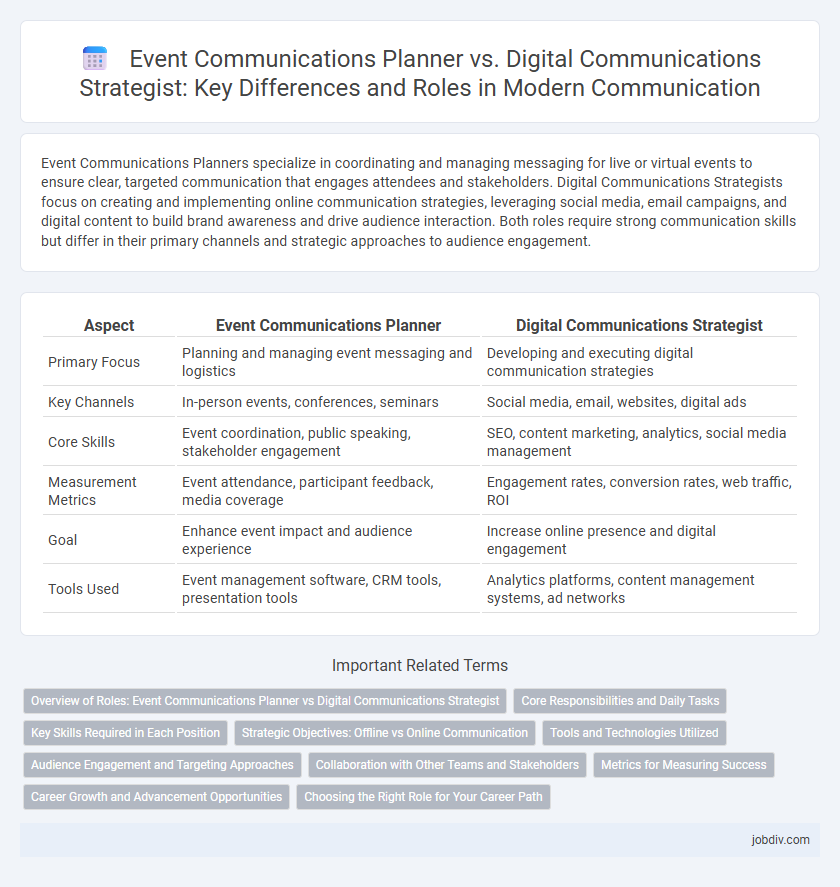Event Communications Planners specialize in coordinating and managing messaging for live or virtual events to ensure clear, targeted communication that engages attendees and stakeholders. Digital Communications Strategists focus on creating and implementing online communication strategies, leveraging social media, email campaigns, and digital content to build brand awareness and drive audience interaction. Both roles require strong communication skills but differ in their primary channels and strategic approaches to audience engagement.
Table of Comparison
| Aspect | Event Communications Planner | Digital Communications Strategist |
|---|---|---|
| Primary Focus | Planning and managing event messaging and logistics | Developing and executing digital communication strategies |
| Key Channels | In-person events, conferences, seminars | Social media, email, websites, digital ads |
| Core Skills | Event coordination, public speaking, stakeholder engagement | SEO, content marketing, analytics, social media management |
| Measurement Metrics | Event attendance, participant feedback, media coverage | Engagement rates, conversion rates, web traffic, ROI |
| Goal | Enhance event impact and audience experience | Increase online presence and digital engagement |
| Tools Used | Event management software, CRM tools, presentation tools | Analytics platforms, content management systems, ad networks |
Overview of Roles: Event Communications Planner vs Digital Communications Strategist
An Event Communications Planner focuses on orchestrating messaging for live or virtual events, managing audience engagement, and ensuring cohesive communication before, during, and after events. In contrast, a Digital Communications Strategist develops and implements online content strategies, utilizes social media platforms, SEO, and analytics to enhance brand visibility and audience interaction. Both roles require strong communication skills but differ in their primary channels and strategic goals within the communication landscape.
Core Responsibilities and Daily Tasks
An Event Communications Planner coordinates logistics, manages event promotion, and ensures consistent messaging across platforms to drive attendance and engagement. A Digital Communications Strategist designs online campaigns, analyzes digital metrics, and optimizes content for SEO and audience targeting to enhance brand presence. Both roles require strong project management skills but differ in focus: events versus digital channels.
Key Skills Required in Each Position
An Event Communications Planner requires expertise in project management, stakeholder coordination, and live event promotion, ensuring seamless execution and audience engagement during physical or virtual events. A Digital Communications Strategist must excel in data analysis, content strategy, SEO, and social media management to optimize digital campaigns and enhance online brand presence. Both roles demand strong communication skills, but the Event Communications Planner leans towards logistics and in-person interaction, while the Digital Communications Strategist prioritizes digital tools and metrics-driven strategies.
Strategic Objectives: Offline vs Online Communication
An Event Communications Planner focuses on strategic objectives that prioritize offline communication, emphasizing face-to-face engagement, audience interaction, and experiential brand activation during live events to build strong personal connections. In contrast, a Digital Communications Strategist targets online communication strategies, leveraging social media, email campaigns, and digital content to drive brand awareness, engagement, and measurable digital ROI. Both roles align with organizational goals but apply distinct methods tailored to offline experiential impact versus scalable, data-driven online outreach.
Tools and Technologies Utilized
Event Communications Planners primarily utilize event management software, registration platforms, and onsite communication tools such as walkie-talkie apps and digital signage to coordinate real-time interactions and logistics. Digital Communications Strategists focus on social media management tools, email marketing platforms, SEO analytics, and content management systems to optimize online presence and audience engagement. Both roles leverage data analytics tools, but their core technologies differ based on the event-centric versus digital-channel-centric communication strategies.
Audience Engagement and Targeting Approaches
An Event Communications Planner specializes in crafting tailored messaging for live interactions, leveraging in-person dynamics to maximize audience engagement through direct experience and immediate feedback. A Digital Communications Strategist focuses on data-driven targeting approaches, utilizing analytics, social media algorithms, and personalized content distribution to reach segmented online audiences effectively. Both roles prioritize audience engagement but diverge in execution: one emphasizes immersive, real-time communication, while the other optimizes digital channels for precision targeting and scalable interaction.
Collaboration with Other Teams and Stakeholders
An Event Communications Planner collaborates closely with event coordinators, vendors, and on-site teams to ensure seamless message delivery during live events, aligning communication goals with event logistics. In contrast, a Digital Communications Strategist works integrally with marketing, IT, and analytics teams to create data-driven campaigns that optimize online engagement across platforms. Both roles require strong stakeholder management skills, but the planner emphasizes real-time coordination while the strategist focuses on cross-channel digital integration.
Metrics for Measuring Success
An Event Communications Planner evaluates success through metrics such as event attendance rates, audience engagement levels during the event, and immediate feedback surveys. A Digital Communications Strategist measures performance using digital analytics, including website traffic, social media engagement, click-through rates, and conversion metrics. Both roles prioritize data-driven insights but differ in channel-specific indicators aligned with live event execution versus digital campaign impact.
Career Growth and Advancement Opportunities
Event Communications Planners specialize in organizing and managing communication strategies for live events, offering clear pathways to senior roles in event management and corporate communications due to their expertise in real-time audience engagement and logistics. Digital Communications Strategists focus on online platforms and data-driven content delivery, presenting expansive career growth opportunities in digital marketing, social media management, and brand strategy, driven by the increasing demand for digital presence optimization. Both roles offer unique advancement potential, with Event Communications Planners excelling in experiential marketing leadership and Digital Communications Strategists advancing towards roles in digital innovation and integrated communications management.
Choosing the Right Role for Your Career Path
Event Communications Planners specialize in coordinating and managing communication efforts for live events, ensuring seamless messaging and audience engagement on-site. Digital Communications Strategists focus on creating data-driven online campaigns, leveraging social media, SEO, and analytics to optimize brand presence and reach. Selecting the right role depends on your career goals: prioritize event-driven, in-person interaction roles for Event Communications Planner, or prioritize digital marketing expertise and virtual audience engagement for Digital Communications Strategist.
Event Communications Planner vs Digital Communications Strategist Infographic

 jobdiv.com
jobdiv.com